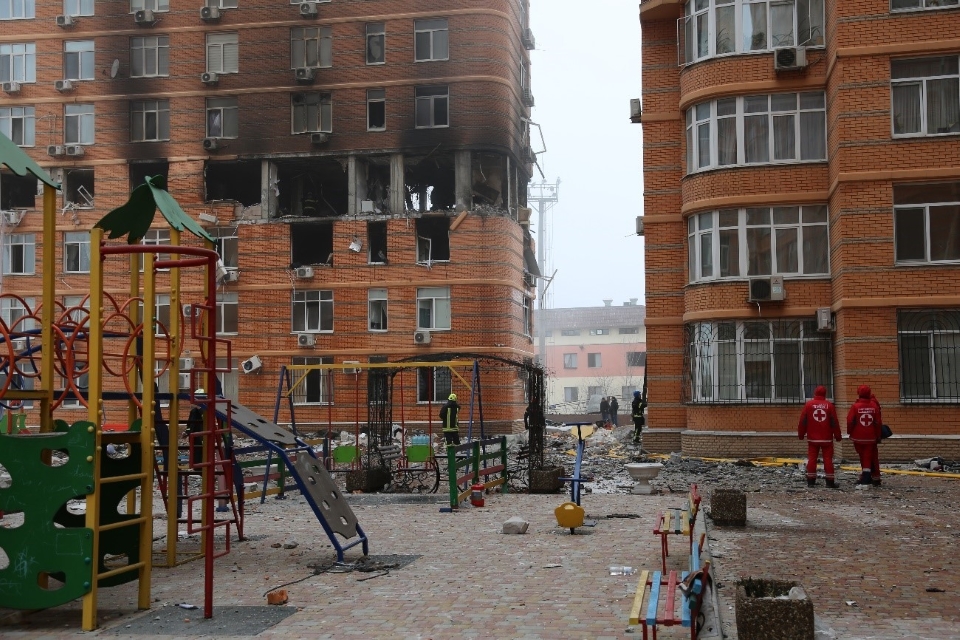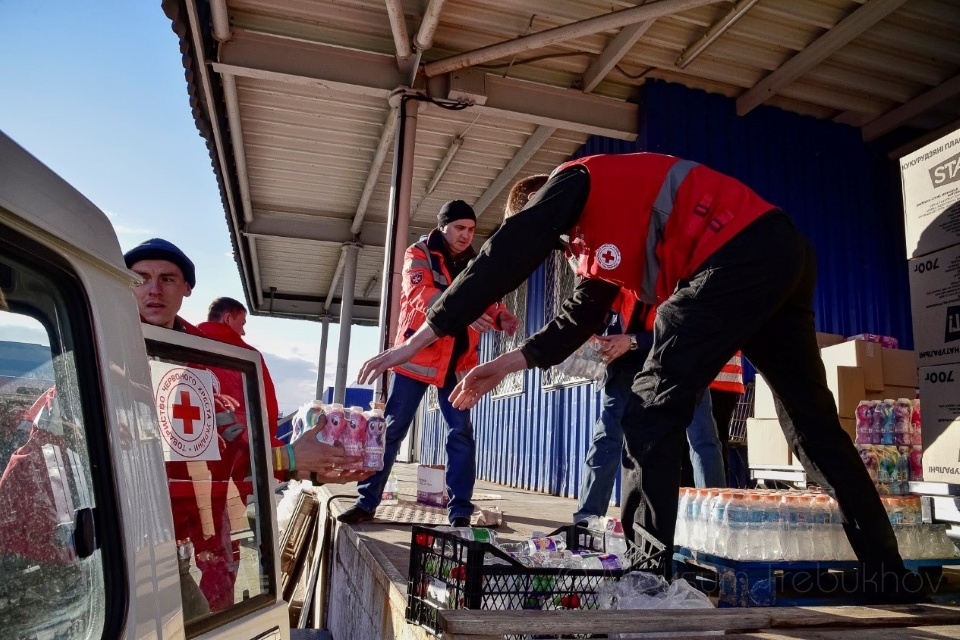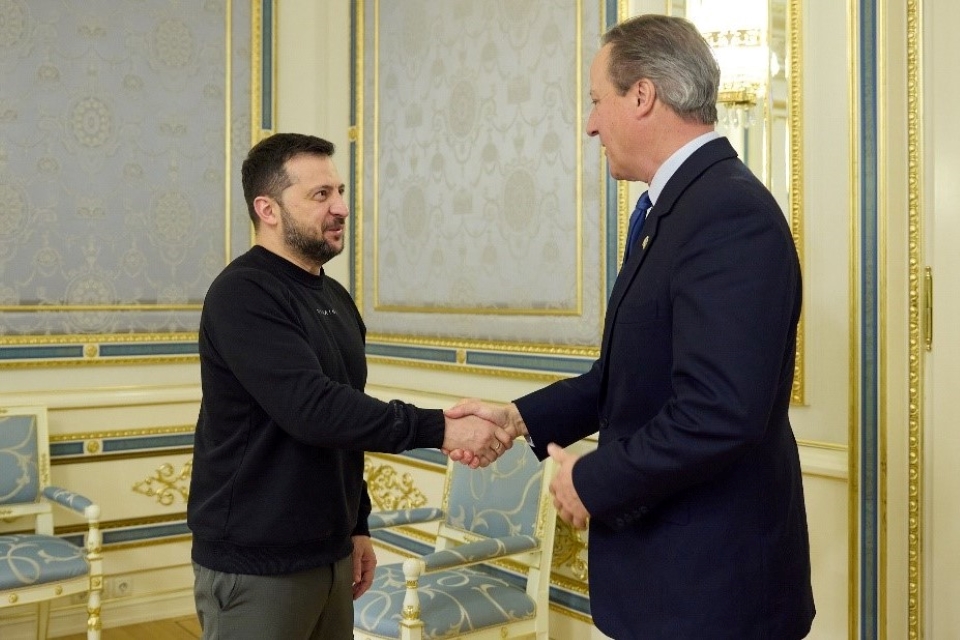UK government's humanitarian response to Russia’s invasion of Ukraine
Updated 20 March 2024
The Russian invasion of Ukraine in February 2022 has led to a grave humanitarian crisis, with millions of people in dire need. Several million people have been displaced inside Ukraine, and almost 6 million people are registered as refugees across Europe. This is now the largest refugee crisis in Europe since the Second World War[footnote 1].
In response to the continuing humanitarian crisis in Ukraine, the UK government is providing humanitarian assistance to Ukraine and Moldova.
1. Scale of humanitarian need

Medics and a firefighters work at the site of a damaged apartment building on 29 December 2023, after a Russian missile attack in Odesa, Ukraine. Russia has launched more than 100 cruise and ballistic missiles, drones and cruise missile into Ukraine. (Photo by Viacheslav Onyshchenko/Global Images Ukraine via Getty Images).
The United Nations (UN) estimates that around 14.6 million people need humanitarian support within Ukraine, with around a third of the population forced to flee their homes and becoming displaced. Now, 2 years into the conflict, life in much of Ukraine continues to be a struggle.
Food, medicine and basic hygiene items are scarce in the worst-hit areas. People have been cut off from basic services such as water, education and energy. Lives have been shattered. Ensuring humanitarian assistance gets in and people can get out of these areas is a major challenge, which is significantly harder during the winter months.
2. UK government humanitarian objectives
The Foreign, Commonwealth & Development Office, working with other UK government departments, seeks to provide lifesaving assistance and protection to those who need it most in Ukraine.
UK government funding aims to get to the hardest to reach areas and to build up local and national capacity in Ukraine to support vulnerable people.
Our 3 objectives are to:
- provide humanitarian assistance in Ukraine and to people seeking refuge in the region. This includes protection and life-saving assistance, with a focus on the most vulnerable, including people with disabilities, the elderly, women and children
- work with our allies to ensure that the international humanitarian system delivers a well-coordinated and well-funded response
- press for respect for International Humanitarian Law (IHL) and call for unimpeded humanitarian access to ensure humanitarian assistance gets to those who need it most and enable people to leave the worst affected areas safely
3. What the UK government is doing
Since Russia’s brutal invasion in February 2022, the UK government has committed a total of £357 million in humanitarian assistance to Ukraine and the region. This includes funding to UN agencies, non-governmental organisations (NGOs) and the Red Cross.
The UK’s initial funding of £220 million helped the international response to reach 15.8 million people in 2022. This included £25 million in matched funding to the Disasters Emergency Committee (DEC) appeal – our largest ever aid-match contribution.
During the Prime Minister’s visit to Ukraine in January 2024, he announced a new winter support package for Ukraine. This brings the total humanitarian support in the 2023 to 2024 financial year to £137 million. It demonstrates the UK government’s ongoing commitment to Ukraine, and to supporting its people in the face of ongoing Russian aggression.
In February 2024 the UK pledged £8.5 million in humanitarian funding to the Red Cross Movement and the Ukraine Humanitarian Fund. The Foreign Secretary announced this at the United Nations in New York, to mark 2 years since Russia’s invasion of Ukraine.
A priority for UK funding is to protect the most vulnerable people, including women and children, the elderly and those with disabilities, in Ukraine and Moldova.
The UK also carries out humanitarian diplomacy, working with the Ukrainian government and our partners to ensure the international response reaches and protects the most vulnerable people. For example, Foreign Secretary David Cameron met with some of our humanitarian partners in Odesa on his first visit to Ukraine in November 2023.

The Ukraine Red Cross Society delivering aid (Maksym Trebukhov 2022, Crown Copyright).
4. UK assistance inside Ukraine
The UK government is working with partners organisations to provide life-saving assistance inside Ukraine.
Our funding for 2023 to 2024 includes:
- £16 million to support Ukraine’s response to the Nova Kakhovka Dam disaster. Funding to the Red Cross movement, Ukraine Humanitarian Fund, managed by UN OCHA and International Organization for Migration (IOM), supported people affected by the dam’s destruction. This included rapid response equipment, along with shelter and other essential supplies
- £34 million for the UN and other organisations to provide shelter and warm winter clothing announced by the Prime Minister in October 2023. Funding for the Ukraine Humanitarian Fund, and distributed through local partners, and to Mercy Corps and the IOM, will help Ukrainians get through winter
- £17 million announced by the Foreign Secretary during his November 2023 Ukraine visit to support Ukrainians directly impacted by the invasion. This includes support with essential winter supplies and for evacuation from front line areas. Part of this funded the Ukraine Red Cross Society (URCS) providing medical supplies to directly-affected communities, and the Nonviolent Peaceforce supporting volunteer organisations delivering humanitarian assistance in dangerous front-line locations
- a £29 million winter humanitarian response package, plus £7.75 million for humanitarian activities, announced during the Foreign Secretary’s USA visit in December 2023. The £7.75 million is for the needs of the most vulnerable, such as women, girls, older people and people with disabilities. The winter funding goes to the Red Cross movement, Mercy Corps, IOM and the Ukraine Humanitarian Fund

Foreign Secretary David Cameron meeting President Volodymyr Zelenskyy in Kyiv, November 2023.
During 2022:
Our support to the UN enabled it to reach those in greatest need, coordinate assistance on the ground and quickly increase its services. Together with the UN, our support reached a total of 9 million people, and:
- contributed towards UNFPA (United Nations Population Fund) programmes for people affected by gender-based violence and for sexual health provision. In November 2022 we announced a further £3.45 million in support
- included a £15 million partnership with UNICEF, which is providing Water, Sanitation, and Hygiene (WASH) services and education to children and families
- supported the Red Cross which assisted with education, shelter provision and efforts to prepare for winter across Ukraine, as well as programmes that strengthen the capacity of national humanitarian organisations
The UK made its largest ever aid-match contribution to the Disasters Emergency Committee (DEC), allowing local NGOs to:
- provide clean water supply to 1.7 million people
- establish 12 support centres for people who have been internally displaced, providing information, protection, and essential relief items
- set up 4 health facilities, providing medical supplies and assistance
The UK also provided over £8 million of in-kind assistance, including food, medical items, and specialist equipment through our humanitarian funding, including:
- £2 million in food assistance
- 76 new and 20 NHS ambulances
- vital medical supplies to Ukraine, with an additional 70 pallets of bandages, crutches and other much-needed equipment in January 2023, to support UK-MED. We also funded UK-MED to provide specialist training, establish mobile health clinics, and to assess the need of people in Ukraine
The UK further supported the response to the harsh winter conditions with:
- £4 million to IOM to provide generators and cash assistance, announced by the Prime Minister in November 2022
- £12 million to the World Food Programme to provide food vouchers and in-kind food relief, also announced by the Prime Minister in November 2022
- additional emergency vehicles
5. UK assistance in the region around Ukraine
The UK is also providing assistance to Moldova, to assist in supporting its refugee population which is one of the highest in Europe per person. In May 2023, we announced £10.5 million that will support Ukrainian refugees and the Moldovan communities that host them. This funding is going to UNICEF, World Food Programme (WFP) and United Nations Population Fund (UNFPA). We are also providing technical advice to the Government of Moldova on providing social protection for vulnerable people.
In the immediate aftermath of the invasion, we provided funding to support countries in the region assist arriving refugees. During 2022 to 2023:
- the UK sent humanitarian experts to Poland, Romania and Moldova. They coordinated closely with regional governments to ensure assistance was delivered safely into Ukraine, while supporting those seeking refuge
- UK support to the Red Cross helped it to provide essential health services for refugees in need, with special emphasis on mental health and psychological support in Poland, Romania and Moldova
- DEC funding provided hot meals, food parcels, or food vouchers to over 120,000 people across Poland, Romania and Moldova. It has also established 47 refugee centres, and provided legal assistance to those in need. Over £1.7 million of DEC funding has been spent through local NGOs in the region
- UK funding to the UN Refugee Agency has helped it to reach 4.32 million people fleeing the conflict in 2022. This included cash assistance, which supported over 987,000 refugees across the region
- the UN Refugee Agency also supported Polish authorities in tackling the challenges brought by winter, providing warm clothing and insulating shelter, and planning shelter to accommodate internally displaced people in Ukraine
6. Other UK government support for Ukraine
Find out more about UK visa support for Ukrainian nationals travelling to the UK and view the government’s guidance on moving to the UK if you’re from Ukraine.
-
Source: United Nations Refugee Agency (UNHCR) ↩
